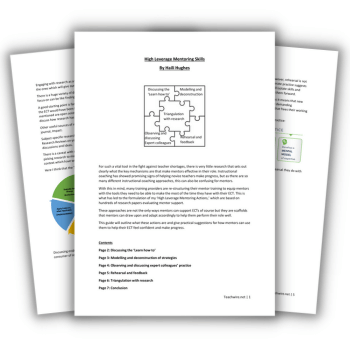Middle leadership in schools – How to succeed in this tricky role

Middle leadership in schools is tough but rewarding. Here’s how to succeed in this challenging role…

- by Teachwire
- Classroom expertise and free resources for teachers

There’s no denying that middle leadership in schools is challenging. You have to be all things to all people.
You must lead by example. This means still being an excellent classroom teacher, as well as making sure everyone in your department is excellent too.
And that’s before we even get to the meetings, the emails, the data reports and the phone calls from parents.
But being a middle leader is also one of the most rewarding roles you can take on. Here’s some advice from those in the know about how to excel in this challenging role…
How to become a better middle leader
Get to know your team
When it comes to middle leadership in schools, some people prefer the ‘keep your distance’ form of leadership. While that does have its benefits, it does also limit how well you can manage your department.
Spending time with your fellow teachers, from ECTs to those who have been there for 30 years or more, means you are far better equipped to get the best out of all of them.
I’m not saying you need to be David Brent, but have lunch together, do end-of-term activities, chat.
Get everyone involved
Channelling the talents of each individual in your department and giving them responsibilities is the best way to get discretionary effort.
Find out early on what their particular passions and interests are. Would the eager ECT like to start a creative writing club? Is there an excellent teacher desperate for a new challenge who could lead some training sessions or mentor a trainee?
I manage a group of 16 teachers. One of the first things I did when I became subject leader was to find out who wanted to lead on key areas in the department.
I’m not in a position to create TLRs for anyone. However, giving your team some in-house leadership responsibilities will prepare them well for when those promotions do come up.
Don’t be afraid of difficult discussions
At my school we like to call these ‘rich and challenging’ conversations – with the emphasis on challenging!
Inevitably, when you’re undertaking middle leadership in schools, these will need to happen at some point in your role. There will be a plethora of unexpected problems you may have to tackle.
“Giving your team some in-house leadership responsibilities will prepare them well for when those promotions do come up”
These will range from minor issues that you can resolve easily to more worrying issues of underperformance or unprofessionalism.
They are never easy. However, if you know your team well you will have some idea of how to approach the conversation.
Sometimes you’ll need to pass these issues on to an SLT line manager and that’s OK. Ask if you can be present for these discussions so that you can learn how to act and what to say.
Find a vent friend
My last head of department gave me a sound piece of advice before he left. Find someone, preferably outside of your department, whom you can vent to when you’re having a rubbish day.
It’s no good ranting in front of your team about the latest school initiative, the amount of reports you have to write or the Year 11 mock exam results.
“Find someone, preferably outside of your department, whom you can vent to”
This will only serve to create stress and resentment for your staff. Then no one is going to be willing or able to perform at their best.
Take time out to sit in a friend’s classroom after school and have a good moan. Always being sure to listen to their problems too. It will make you both feel better and it also means you don’t carry your issues home.
Once the ranting is out of the way you will be better prepared to speak calmly and carefully about the problem and find a suitable solution.
Nikki Carlin is a head of English. She blogs at noopuddles.wordpress.com and you can follow her on Twitter at @noopuddles.
Ofsted advice for middle leaders
When the inspectorate calls be prepared to answer “How do you know that?”, and make sure you have the evidence to back up your claims, advises James Bowen…
If you’re part of middle leadership in your school, it is highly likely that an Ofsted inspector will want to meet with you during their time in your school.
I know from personal experience how daunting this can be and the pressure you feel not to let people down. However, with the right preparation and by following a few key principles, it is actually a great opportunity to show the positive impact you are having as a leader.
When meeting with an inspector, it is vital you keep in mind that they will be interested in two key things above all else: evidence and impact.
You need to be prepared to answer the key question, “How do you know that?” – especially when talking about your area of responsibility, backing up any statements you make with clear evidence.
For example, if you are going to say that standards are improving, be prepared to explain how you know this. Inspectors will quickly lose confidence if you make statements that you can’t substantiate.
Evidence
Evidence can take a variety of forms, including:
- end-of-key-stage data
- internal school data
- findings from monitoring activities
- parent/pupil voice
The greater the variety of corroborating evidence you have to draw on, the better.
I have always found the best way to practice this is to sit with a trusted colleague and get them to ask two simple questions:
- What are standards like in your subject?
- What are standards like in your department?
Then, for each statement you make, get them to follow up by asking “How do you know that?”. In the past, this has really helped me to see where my evidence was strong and where I needed to do some extra digging. Far better to find this out ahead of time than when sat opposite an inspector.
Take care to avoid overly optimistic pronouncements that are not backed up by evidence. There is a fine line between presenting things in the best possible light and trying to pull the wool over an inspector’s eyes.
From my experience of school inspection, the latter will rarely work. If the evidence suggests there are some issues that need addressing, explain these clearly and, more importantly, how you plan to tackle them.
Impact
The second key point to remember is that Ofsted is primarily concerned about outcomes and therefore the inspector will want to know about impact.
A common trap that middle leadership falls into is to describe at great length all the things they have ‘done’ in school but not the impact each strategy has had on children and their achievement.
As a SENCo relatively new to post, I once made the mistake of thinking the inspector would be suitably impressed as I reeled off a long list of all the different interventions we had taking place across the school, only to be somewhat taken aback when met with the response, “That’s interesting, but so what?”.
An inspector will want to know the difference that your strategy made. For example, “We introduced a whole-class approach to teaching reading, and the impact it had on the children was…”.
That said, there is nothing wrong with explaining any strategies you put in place that did not have the desired impact. This will show you to be a reflective leader and someone who is able to evaluate objectively.
Different groups
Whilst evidence and impact are the two key words to keep in mind when preparing to meet an inspector, it is also vital to think about different groups of pupils.
Are there variations in standards within your area of responsibility? Do boys and girls achieve equally well? How well do those eligible for pupil premium funding fair? What about SEN and EAL pupils?
It may be that standards are excellent and improving in your subject overall, but that there is a specific issue for a specific group.
Again, you will need to be able to talk about whatever challenge you may be facing, how you know this (evidence) and what you are doing to tackle it.
If you enter into a conversation with an inspector ensuring your focus is on evidence and impact, it is likely to be a positive experience.
Remember, this is an opportunity for you to shine and to demonstrate the difference you are making for the children in your school. With the right preparation, who knows – you might even enjoy it!
James Bowen was the headteacher of a large, successful school in Hampshire before becoming the director at NAHT Edge, the teachers’ trade union for aspirational leaders, in 2016.










